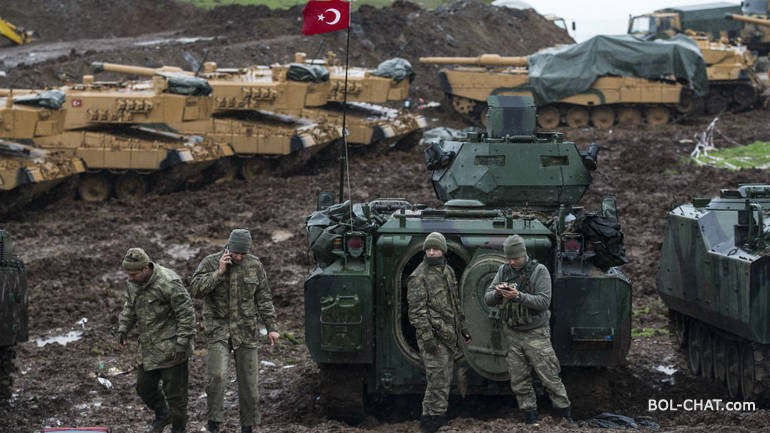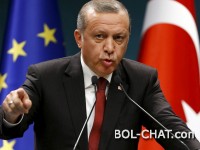Erdogan: Why NATO does not come to Syria?
Regime forces crossed the road between the cities of Doume and Haraste and isolated them, Erdogan calls NATO in Syria.

The Syrian army has cut off the road between Doume and Haraste towns and isolated them on Saturday in the last rebel enclave of East Ghouta. On the second battlefield in Syria, Turkey has officially announced the continuation of an offensive against the city of Kobane in the offensive against the Unit of National Protection in Syria (YPG) NATO because it does not help her.
"They isolated Douma from the rest of the Eastern Ghoute, after they took control of the road linking that city with Harast in the west and Misrab in the south," the Syrian Observatory for Human Rights (SOHR) announced on Saturday.
"Regime forces managed to divide Eastern Ghout into three parts - Douma and its suburbs in the north, Harasto in the west, and the rest are southern sites," the Observatory reported.
AFP reports that afternoon Douma was exposed to air and artillery attacks.
Syrian President Bashar al-Assad's forces are trying to capture the last area that the rebels hold almost at the Damascus gate and take over more than half of the enclave, which has 100 kilometers square.
In three weeks, 976 civilians were killed
While the international community turned out to be powerless to stop the bloodshed, with the support of its Russian ally, the Syrian regime is determined to conquer this rebel stronghold in which nearly 400,000 people are surrounded by 2013.
The offensive began with air campaigns rarely seen in intensity even for Syria, which since March 15, 2011, suffered a war with more than 340,000 victims.
After the air campaign, ground attacks by pro-regime forces and their allies followed.
In three weeks, 976 civilians were killed, of which 208 were children, and more than 4300 were wounded, according to SOHR.
The rebel groups tried, without success, counter-defenses until Saturday, when they started withdrawing from the bombs.
The Syrian regime has been trying to keep the encircled rebel areas from the beginning of the conflict.
As of February 18, only two convoys of aid could enter Ghout to deliver supplies to disguised civilians, thanks to the five-hour ceasefire for five hours unilaterally declared by Russia.
The resolution of the UN Security Council on a one-month cease-fire remained a dead letter on paper.
UN: Syrian regime plans 'apocalypse'
Syrian President Assad warned that the attack would continue until Ghout fell.
The second largest city in Syria, Halep, in December 2016, occupied Syrian forces after devastating bombing of the regime with the help of its allies, Russian aviation.
Thanks to the entry of the Russian army into the Syrian conflict in 2015, Assad's regime has downed victories against insurgents and has managed to regain control over more than half of Syria.
The UN High Commissioner for Human Rights has accused the Syrian regime of planning an "apocalypse" in its own country on Wednesday.
At the second battleground in Syria, Turkish soldiers and their allies are moving towards the city of Afrina under the control of the Kurdish Syrian militia (YPG), which Ankara considers to be the terrorists and the Syrian PKK branch, and the Western countries, among them the United States, a war against the Islamic State of Iraq and Levant (ISIL).
On January 20, Turkey launched an offensive on Afrin, calling for its right to push "YPG terrorists" from the Turkish border.
In that offensive, 200 civilians were killed, according to SOHR.
Turkish President Recep Tayyip Erdogan said Turkish forces will go "to Iraqi borders".
Erdogan: NATO, why do not you come?
Erdogan regularly mentions Manbury, where US troops are deployed, which has tightened relations between Ankara and Washington, which YPG is an ally.
The city of Kobane has a great symbolic value for the Kurds because it was at the center of intense clashes between ISIL and YPG, which it managed to take on ISIL in January 2015 after four months of conflict.
On Saturday, Erdogan urged NATO to back Turkish offensive.
"Is not Turkey a member of NATO? We responded to calls to intervene in Afghanistan, Somalia, the Balkans, and now I am calling for NATO help, come to Syria. Why not come?" Erdogan asked.
"Turkish forces are four kilometers to Afrina," SORH said, according to AFP.
- 10 Mar, 2018
- 1316 views
- No comments


